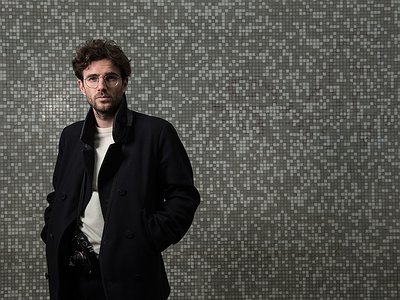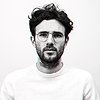Name: Boris Bunnik
Nationality: Dutch
Occupation: Producer, Sound Artist
Current Release: Autonomous on Delsin Records
Recommendations: Alvin Toffler - Future Shock = book / Bruce Gilden - Face = Book, magnum photographer.
Website / Contact: If you enjoyed this 15 Questions interview with Boris Bunnik, make sure to visit his facebook profile and soundcloud page for further information and to stay up to date on his prolific release schedule.
When did you start writing/producing music - and what or who were your early passions and influences? What what is about music and/or sound that drew you to it?
I was 7 years or so when I got my first cassette deck player and my nephew from the urban city started sending me his mix tapes with 90’s house and techno. My father also found a cassette tape once on the island of Terschelling where I lived and it was full of acid house and mental weird electronic minimal drug stuff from the 90’s. I first didn’t really understand it because I only checked a lot of 90’s house but at some point this grabbed me completely and I got hooked. Gabber music also played a big role in my early teenager years but I think it became too hard for me and I moved on to different styles.
I learned to mix and play with records at the age of 15 and started a residency at a local dance cafe/club on the island where I lived. The owner of this place was a resident DJ and did some production as well. I think seeing what he did with this kind of small setup triggered me to start making my own productions as well, or explore the possibilties. I was really curious about it. it was just a magical unknown world I could start to discover. At an early age I was warming up for DJs from Amsterdam like Dimitri, Marcello and Isis during club nights. They also were of course a source of inspiration for me.
There was a moment at the age of 16 that a colleague of mine gave me his iPod with Autechre and Monolake on it when I walked drunk out of a pub. From that point on things really changed for me. Hearing music from such another perspective and with a different approach.
Electronic music has always been present in my life as a consumer or prosumer even though at that time on an island not everything was available. But it was magical to discover new things.
For most artists, originality is first preceded by a phase of learning and, often, emulating others. What was this like for you? How would you describe your own development as an artist and the transition towards your own voice? What is the the relationship between copying, learning and your own creativity?
Make loads of crap for years and go on from there … It takes years to master something I think. You learn with every sketch or copy or version of whatever …
Learn to separate the chaff from the grain out of your own creations. I learned by doing things and making mistakes, not by buying myself expensive courses or leaning on other peoples skills. When you reach the point, “this is me I’m hearing”, no matter if it has influences from other artists (inevitable), then go on from there and keep developing. Stick to something and get rid of the urge that you want to be all over the place. You simply can’t. But in the beginning it doesn’t matter, just mess around. You will reach a point where you’re satisfied. I was lucky that Rush Hour discovered some of my early productions in the myspace era, it gave me motivation to go on. Even though my first records were not perfect at all. I put my soul in it. I tried many different things to reach a point were I was feeling comfortable with what I was making. Electronic music is like everything in pop culture. You take something from the past (aware or unaware), give your own twist to it and place it in the present.
What were your main compositional- and production-challenges in the beginning and how have they changed over time?
Understanding the basics about the technical side of production. And finding the right tools to translate my ideas, working on a good workflow. I think you need to build on a big reference of sound in your head and I think it takes years before you master something.
But you should start somewhere and just have fun. I think making my productions match the level of audio mastering of existing records was my biggest challenge. Technical skills can help but also be a big distraction. They can block the creative process, but they can also be a creative tool.
What was your first studio like? How and for what reasons has your set-up evolved over the years and what are currently some of the most important pieces of gear for you?
I started with the early versions of Reason, just getting to know all the basics in a virtual environment. It was a lot of fun and intimidating at first sight. I switched over to Logic after a couple of years and did a lot in combination with rewire and just one piece of hardware at that time. A Nord Rack 2. Machine Conspiracy was made with this setup completely.
At some point I felt I needed to have more hands on controls and hardware made me more curious. Especially the kind of characteristics you could achieve with this. I started adding more gear like the kurzweil K2000 and the Waldorf Microwave 1, these have stayed with me until today. I was also one of the early users of the Acidlab Miami clone, I got one of the first versions with different sound characteristics but eventually sold it for a real 808.
All my mix downs and effects processing was done digitally. I still do so because I think I get proper results with it.
A recent addition to the studio is a JD800. I fell in love with it, it’s spot on and suits my sound. Just a fantastic interface for sound designing and building your own timbres quickly. Also I’ve added an Elektron Rytm. It’s a beefy machine.
I think now I’ve come to a point where I have a complete hybrid setup between wavetable, fm, analog, rompler and digital/analog drum programming. I like the versatility of DAW’s and the hands on control and intuitive jamming on external gear. This, in combination with a little bit more external effects processing for some flavour and sound characteristics.
Eventually I left Logic for Live because of it’s flexibility but still like the onboard plugins and sound characteristics more from Logic. But with Live I’m more flexible and creative I think.
The studio is an ongoing project and is never finished but that is what keeps it interesting.
How do you make use of technology? In terms of the feedback mechanism between technology and creativity, what do humans excel at, what do machines excel at?
I think in the end you need to master your equipment and know how to translate your ideas quickly. The workflow is important. Of the highest importance actually. If you struggle with stuff that doesn’t respond or has bugs like shitloads of beta software nowadays’ you lose the flow.
Its about getting into the zone.
Technology is great but you need to perform on technological equipment in order to bring it live and translate your intentions to make things organic and evolving. Otherwise it’s just a loop and something static. Making electronic music is about turning something static into something vivid that gets rid of this static character. We as humans can explore the capabilities of this technology, sometimes the people who make it don’t even know how far you can take it to make interesting timbres with it. An instrument should also be intuitive on certain levels.
Production tools, from instruments to complex software environments, contribute to the compositional process. How does this manifest itself in your work? Can you describe the co-authorship between yourself and your tools?
Of course, what you use is how you sound.. But it depends on the kind of personal processing you add to this. If you use a tr808 and juno60 in a plain conservative way you’re gonna sound like roland.
I can not say this enough, it’s not about how much you have and how much gear is breathing in your neck to be used. If it's not within range you rarely use it. So my studio is hands on and everything is within the range of my two arms. It’s a workflow that is compact and fast and that is interconnected with my DAW.
If there is any delay or loss of inspiration it’s due to the lack of efficient workflow and software beta mistakes. It’s the same in my DAW, since I’ve switched to Live I took me some time to create a workflow that connects properly with my outboard gear, or in a way I wanted it to work with my DAW. It's the same with digital sounds, I had to organise things properly so I can quickly work and find the kind of sounds I need without having to repeat the same boring technical or repetitive software browsing over and over again. Why would you repeat the same actions all the time? Software allows us to skip this proces and it’s very convenient.
But in essence:
I think I’m most creative with 1 drummachine, 1 synth and digital workflow processing. It’s good to have options of course to keep things interesting but some moments you have to focus or get fascinated by a certain device, so you will hyperfocus on it for some time.
I really like post production, shaping something until you are satisfied - but there is a danger: perfection.
Collaborations can take on many forms. What role do they play in your approach and what are your preferred ways of engaging with other creatives through, for example, file sharing, jamming or just talking about ideas?
Collabs are something I really want to do in the future, I never really found someone to work with. It’s hard to share the same vision or have the kind of connection to be able to make personal music together. I guess it's unique when people find this. Or maybe it’s just too personal for me and I tend too lose myself so much in the music that interaction for me becomes a bit of a struggle. But of course I share a lot of music with others and share ideas and stuff. It’s inspiring to do so and feedback on each other. I love to help people too, I can hear it instantly if something is good or bad. Technically or in the arrangement.
Sometimes a friend of mine drops by or I visit him in the studio, John from the dutch techno duo Duplex. They have been making detroit inspired techno for many years and it’s really inspiring to see how he works and vice versa. You learn a lot from that. Sometimes it’s just a simple thing that can really spark new ideas.



